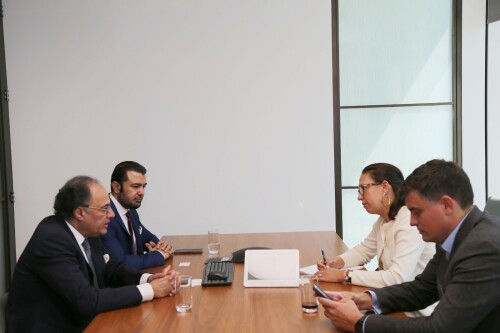Global Investors Express Confidence in Pakistan’s Economic Reforms
Leading global investment firms, including Amundi and Lion’s Head Global Partners, have signaled strong interest in Pakistan’s sovereign instruments and upcoming ESG-aligned initiatives, indicating a positive response to the nation’s economic reform and transformation agenda.
This affirmation followed a strategic meeting in London led by Finance Minister Muhammad Aurangzeb with key global investors, such as Oliver Williams, Portfolio Manager for Emerging Markets Fixed Income at Amundi, and Maud Le Moine from Lion’s Head Global Partners. Discussions centered on Pakistan’s economic prospects, reform plans, and potential investment opportunities, according to a statement from the Finance Division.
Aurangzeb stated during the meeting that Pakistan is undergoing a transformation and is open to investors seeking impact, scale, and certainty, offering all three qualities.
The finance minister also updated attendees on Pakistan’s plans to introduce a Panda bond as part of its active debt management strategy, in addition to future initiatives under the Medium-Term Debt Management Strategy (MTDS).
Key Discussion Points:
- Restructuring of state-owned enterprises (Wave 5)
- Ongoing pension reforms
- Preparation for ESG bond issuance in FY2026
Amundi, recognized as one of the world’s top ten asset managers with assets exceeding €2 trillion, reaffirmed its interest in Pakistan’s sovereign instruments and investments aligned with ESG principles. Oliver Williams also voiced considerable interest in the country’s forthcoming bond issuance plans.
Maud Le Moine of Lion’s Head Global Partners, a firm specializing in advisory services for emerging markets, offered specialized technical assistance to aid Pakistan in strengthening investor communications, improving credit rating engagement, and implementing energy sector modeling.
Lion’s Head also reiterated its commitment to supporting Pakistan’s MTDS. The finance ministry acknowledged the offer, clarifying that any advisory engagement would comply with public procurement processes.
Regarding Pakistan’s water treaty policies, Aurangzeb confirmed that the suspension of sovereign water rights is not an option. He also restated the government’s dedication to inclusive growth, ensuring that the Benazir Income Support Programme (BISP) will continue in the next budget.
Aurangzeb provided a thorough overview of Pakistan’s macroeconomic recovery, citing accomplishments such as a primary budget surplus of Rs3.6 trillion, a current account surplus, reduced inflation at 0.3% (April 2025), and a decrease in the debt-to-GDP ratio from 75% to 65%.
The finance minister noted that these indicators have not only stabilized the economy but also enhanced sovereign credit ratings and renewed confidence among multilateral and bilateral partners.
Aurangzeb underscored Pakistan’s steadfast commitment to reforms, aiming to shift from a consumption-driven model to a sustainable growth model focused on exports and productivity.
He also highlighted new tax reforms designed to incorporate the real estate, wholesale, retail, and agriculture sectors into the formal tax framework, while ensuring complete digitization of the tax authority to minimize human discretion and curb corruption.
Aurangzeb detailed the government’s extensive sectoral diversification strategy, mentioning the forthcoming minerals conference and the landmark copper agreement, which is projected to contribute $2.8 billion annually to exports by 2028.



Comments (0)
No comments yet. Be the first to comment!
Leave a Comment